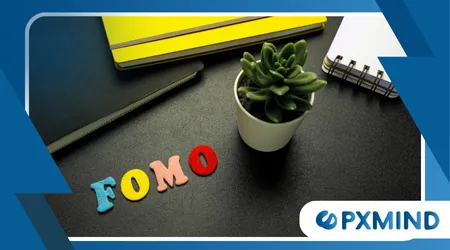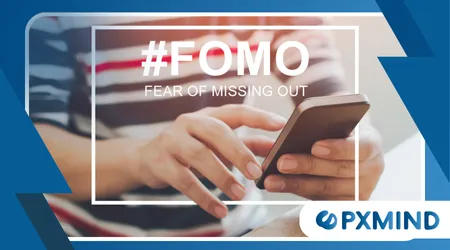Capire la paura di perdersi qualcosa (FOMO)

La sensazione pervasiva di essere esclusi, nota come Paura di perdersi qualcosa (FOMO), è diventata una caratteristica distintiva del nostro mondo iperconnesso.
Annunci
È l'ansia persistente che gli altri si divertano di più, vivano esperienze migliori o vivano vite più appaganti delle nostre.
Questa sensazione non è nuova, ma i social media l'hanno amplificata a livelli senza precedenti.
Siamo costantemente bombardati da scorci attentamente selezionati della vita degli altri, creando una realtà distorta in cui tutti gli altri sembrano prosperare.
Questa esposizione costante può portare a un circolo vizioso di confronti, insoddisfazione e a un bisogno compulsivo di stare al passo.
Non si tratta di un semplice caso di gelosia; è un'ansia profonda di perdere opportunità di relazioni sociali, di crescita personale o persino di avanzamento professionale.
L'era digitale, con il suo flusso infinito di aggiornamenti e notifiche, crea un ciclo di feedback continuo che alimenta questa sensazione.
È lo scorrimento notturno che ci tiene svegli, il controllo frenetico dei nostri telefoni e la sensazione di inadeguatezza che ne consegue.
Questo panorama digitale, pur connettendoci, può anche farci sentire più isolati che mai.
Comprendere questo complesso fenomeno psicologico è il primo passo per ritrovare la nostra serenità e trovare una vera soddisfazione nella nostra vita.
Le radici psicologiche della FOMO
Nel suo nucleo, il Paura di perdersi qualcosa (FOMO) affonda le sue radici in un bisogno umano fondamentale di connessione sociale e appartenenza.
Nel corso della storia, far parte di un gruppo è stato essenziale per la sopravvivenza. L'esclusione significava vulnerabilità, e il nostro cervello è ancora programmato per rispondere ai segnali sociali con un senso di urgenza.
Oggi, questo antico istinto di sopravvivenza si manifesta nella paura moderna di essere esclusi dagli eventi sociali, dalle conversazioni o dalle tendenze online.
Le piattaforme dei social media, progettate per tenerci connessi, sfruttano inavvertitamente questa vulnerabilità psicologica.
Il flusso costante di contenuti crea un senso di scarsità, facendoci credere che ci sia una finestra temporale limitata per partecipare a qualcosa di prezioso.
Gli psicologi spesso collegano la FOMO a una mancanza di autostima e a un forte bisogno di convalida sociale. Spesso cerchiamo conferme esterne per definire il nostro valore.
Leggi qui: Perché continui a scorrere: la psicologia dei feed infiniti
Quando vediamo i successi e le esperienze degli altri, possiamo provare sentimenti di inadeguatezza e credere che la nostra vita sia meno entusiasmante o significativa.
Ciò può portare a un circolo vizioso in cui si cerca di inseguire le esperienze per il gusto delle apparenze anziché per un piacere autentico.
La camera dell'eco digitale: come i social media amplificano la paura di perdersi qualcosa (FOMO)
Le piattaforme dei social media sono i principali motori dell' Paura di perdersi qualcosa (FOMO).
Sono dei filmati attentamente costruiti che mettono in mostra i momenti migliori della vita delle persone, tralasciando opportunamente il banale, il difficile e il decisamente noioso.
Questa rappresentazione selettiva crea una percezione distorta della realtà, facendoci credere che i nostri coetanei vivano vite eternamente perfette.
Non vediamo le ore di lavoro spese per una carriera di successo, i disaccordi che hanno preceduto una foto sorridente di una vacanza o i momenti tranquilli di dubbio e lotta.
Noi vediamo solo il prodotto finale, rifinito.
Consideriamo l'analogia di una scultura splendidamente realizzata.
Ammiriamo il pezzo finito, ma non vediamo le innumerevoli ore di scheggiatura, levigatura e modellatura che ci sono volute per arrivarci.
Guarda qui: Come la prova sociale influenza le tue decisioni quotidiane
I social media ci presentano solo la scultura, lasciandoci confrontare le nostre vite grezze e disordinate con un'opera d'arte impeccabile.
Questa costante esposizione a versioni idealizzate della realtà alimenta la sensazione di essere in qualche modo rimasti indietro, portando a un persistente senso di insoddisfazione.
L'algoritmo, progettato per farci continuare a scorrere le pagine, ci fornisce sempre più di ciò di cui abbiamo voglia, radicandoci ulteriormente in questo ciclo di confronto.

L'impatto tangibile della FOMO sul benessere mentale
La pressione costante di dover stare al passo può avere conseguenze significative sulla nostra salute mentale.
Gli studi dimostrano una forte correlazione tra alti livelli di utilizzo dei social media e tassi più elevati di ansia, depressione e solitudine.
Uno studio del 2018 pubblicato su Rivista di psicologia sociale e clinica hanno scoperto che limitare l'uso dei social media a 30 minuti al giorno ha ridotto significativamente i sentimenti di solitudine e depressione dei partecipanti.
La necessità di controllare i nostri feed e le notifiche può alterare i nostri ritmi del sonno, ridurre la nostra produttività e portare a uno stato di perenne iper-eccitazione.
Immagina, ad esempio, uno studente che studia per un esame importante. Controlla costantemente il telefono, scorrendo le foto delle feste e le storie degli amici.
Ciò non solo li distrae dagli studi, ma crea anche la sensazione di essere esclusi, aggiungendo un ulteriore livello di ansia e stress a una situazione già stressante.
Guarda quanto è interessante: Rituali quotidiani per aumentare la resilienza emotiva
Il risultato è un circolo vizioso di distrazione, senso di colpa e inadeguatezza che rende ancora più difficile concentrarsi.
Questo esempio illustra come il Paura di perdersi qualcosa (FOMO) può influenzare tutti gli aspetti della nostra vita, dal rendimento scolastico alla capacità di essere presenti nei momenti che viviamo.
Strategie per superare la paura di perdersi qualcosa (FOMO)
Superare il Paura di perdersi qualcosa (FOMO) non si tratta di disconnettersi completamente dal mondo, ma di sviluppare un rapporto più sano con esso.
Si tratta di essere intenzionali con il nostro tempo e la nostra attenzione. Una delle strategie più efficaci è praticare consapevolezza—l'arte di essere presenti nel momento.
Quando ci concentriamo sulle nostre esperienze e ne apprezziamo il valore, il fascino di ciò che fanno gli altri diminuisce.
Un altro strumento potente è quello di curare i nostri feed sui social media. Smetti di seguire gli account che ti fanno sentire inadeguato o stressato e segui quelli che ti ispirano.
Dobbiamo anche spostare consapevolmente la nostra attenzione da convalida esterna A soddisfazione interna.
Invece di inseguire esperienze solo per il gusto di scrivere un post, cerca attività che ti diano vera gioia e appagamento.
Immagina un giovane professionista che si sente obbligato a partecipare a ogni evento di networking per paura di perdere un'opportunità di carriera.
Invece di disperdersi, potrebbero concentrarsi sulla costruzione di relazioni profonde e significative con alcuni mentori e colleghi chiave.
In questo esempio, questo approccio intenzionale porta a connessioni più preziose e a un minore esaurimento.
Infine, ricordatevi di programmare regolarmente dei periodi di "disintossicazione digitale", anche solo per un'ora al giorno, per dare alla vostra mente una pausa tanto necessaria dal rumore digitale.
Come ti sentiresti se dessi priorità al tuo benessere piuttosto che a una pergamena di una vita perfettamente filtrata?
Il percorso da seguire: trovare la gioia nel proprio viaggio
In un mondo che ci dice costantemente che non siamo abbastanza, trovare soddisfazione nella nostra vita è un atto rivoluzionario.
IL Paura di perdersi qualcosa (FOMO) farà sempre parte del nostro panorama moderno, ma non è detto che debba controllarci.
Comprendendone le radici psicologiche, riconoscendone l'impatto e attuando strategie intenzionali, possiamo riconquistare la nostra serenità.
Le vite più appaganti non sono quelle con più post sui social media, ma quelle vissute con intenzione, presenza e connessione genuina.
Ricorda, il tuo viaggio è unicamente tuo e il suo valore non si misura in base al numero di "Mi piace" o all'invidia degli altri, ma in base alla gioia che provi in esso.

Domande frequenti
La FOMO è una vera e propria patologia mentale?
Sebbene non si tratti di una diagnosi psichiatrica formale, la FOMO è un fenomeno psicologico riconosciuto.
Si tratta di una forma di ansia sociale che può causare notevole disagio e avere un impatto negativo sul benessere mentale, spesso concomitante a condizioni come la depressione e l'ansia generalizzata.
Come posso ridurre l'uso dei social media senza sentirmi disconnesso?
Inizia in piccolo, impostando limiti di tempo specifici per le app dei social media e programmando periodi senza utilizzo di dispositivi digitali.
Puoi anche disattivare le notifiche non essenziali per ridurre la voglia di controllare il telefono.
Concentratevi sull'utilizzo dei social media come strumento di connessione intenzionale piuttosto che come fonte di consumo passivo.
La FOMO può influire sulla mia salute fisica?
Sì. Lo stress e l'ansia associati alla FOMO possono causare sintomi fisici come mal di testa, difficoltà a dormire, stanchezza e un aumento dei livelli di cortisolo, che possono avere effetti a lungo termine sull'organismo.
++ Una breve panoramica dell'origine, dei fondamenti teorici e della relazione con la salute mentale
